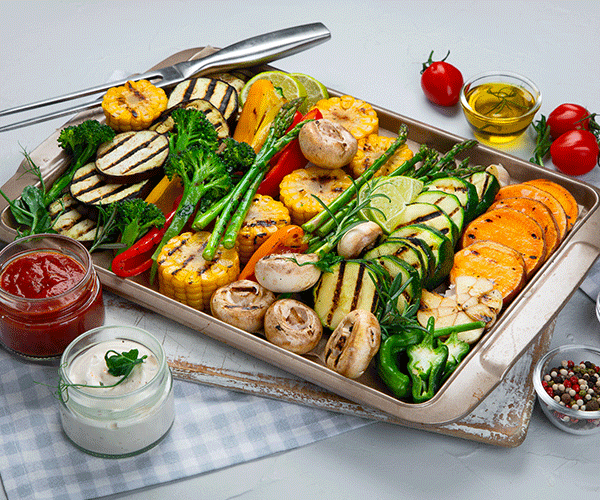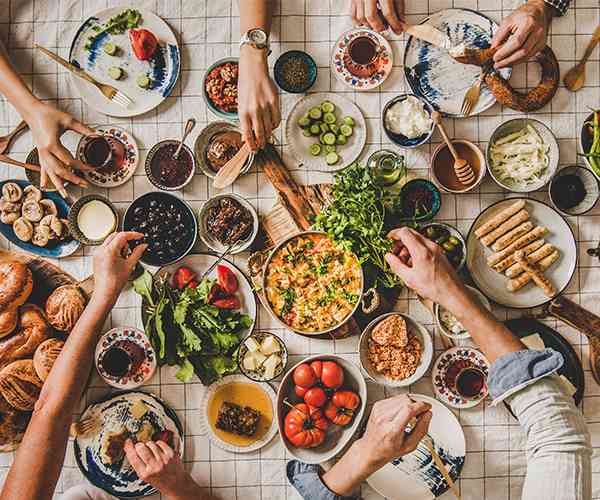Jan 15, 2019
By Stacey Stein
If you’re like many people, chances are “be healthier” – or some variation of this – is at the top of your list of resolutions for the New Year. And you no doubt sincerely want to make a change in 2019 – maybe you’ve even purchased a gym membership or invested in a new blender to make green smoothies.
So if we start the New Year with the best intentions, why do so many of us end the year falling short of our own expectations?
The reason is simple: unrealistic goals that set us up for failure.
“Typically a resolution is a very restrictive or unrealistic goal,” says registered dietitian Shannon Crocker. “I recommend people set a small goal that is realistic and achievable and is more about setting a healthy habit or lifestyle change.”
With this in mind, here’s a look at common New Year’s resolutions that may be difficult to achieve, along with more realistic alternatives to help get you on a path towards achieving a healthier version of yourself this year.
Unrealistic resolution: No more nighttime snacking
Realistic alternative: Theoretically, it would be great to stop eating after an early dinner, say around 6 or 7 p.m. The reality though is many of us feel peckish at night, especially when we’re curled up on the couch watching our favourite TV series.
Before reaching for a bag of chips, Crocker recommends first asking yourself if you’re really hungry or you’re eating out of habit. If you’re truly hungry, she advises opting for light snacks that won’t interfere with your sleep (or your waistline).
Popcorn is one good option when you have the nighttime munchies. “It has some nutrients because it’s a whole grain,” says Crocker. Other nutritious choices for late-night snacking include berries, a handful of nuts, a small bowl of whole grain cereal with milk or an individual cup of smooth cottage cheese. Crocker also recommends these cinnamon orange bran muffins – they’re just as satisfying at night as they are in the morning, and will also give you a boost of protein and fibre.
Unrealistic resolution: Goodbye meat, I’m going vegetarian!
Realistic alternative: Some of us may think that ditching meat is a surefire route to being healthy, but aside from being unrealistic for many people, meat also has health benefits. A more realistic goal is going meatless once or twice a week. “Eating more plant foods is a good idea, but you don’t have to give up meat to be healthy,” says Crocker. She adds that meat is an excellent source of vitamin B12 (vital for a healthy nervous system) as well as easily absorbed iron and zinc, which we need for a healthy immune system. Boosting your intake of legumes and veggies while still incorporating meat into your diet is good for your overall health.
If you’re not sure where to start, look up vegetarian entrées in cookbooks or online and try one meatless meal a week. For delicious family-friendly meatless entrées, try making this curried lentil soup with Havarti (a great way to incorporate lentils into your diet) or this Southwest Power Bowl, packed with protein-rich black beans, edamame and quinoa.
Unrealistic resolution: Cutting out all carbs
Realistic alternative: There’s a mistaken belief that the road to a leaner figure is paved with a carb-free diet. The key isn’t ditching carbs altogether, but instead swapping refined carbohydrates for high-quality carb choices, such as whole grains, lentils and legumes.
“We need some carbs to fuel our brains and bodies, but it’s not healthy to eat a lot of refined grains or sugary carb choices like white bread or cookies,” says Crocker. Instead, she recommends focusing on pairing quality carb choices with protein at your meals. “That will help you feel satisfied for longer.”
Looking for recipes that pair protein with carbs? This Garam Masala Turkey with Raita is a nutrient-dense dinner that also incorporates roasted cauliflower and potatoes. You can eat this quinoa salad with grilled vegetables and cottage cheese for your lunch or dinner main – the quinoa is a source of quality carbs, while the cottage cheese provides a kick of protein. These rainbow veggie pancakes are a meatless dinner option combining sweet and Yukon Gold potatoes along with carrots and green onions (they’re also a great way to sneak more veggies into your kids’ diet.)
Unrealistic resolution: Skipping breakfast
Realistic alternative: The irony about skipping breakfast as an approach to weight loss is that you’re more likely to be hungrier during the day, which can lead to snacking more and making less nutritious choices. “Most people can better manage munchies if they eat a protein-rich breakfast,” says Crocker, adding to steer clear of nutrient-poor choices like bagels or sugary cereals that will leave you feeling hungry and unsatisfied later on.
To help curb your mid-morning donut cravings, look for breakfast choices that are full of protein, healthy fats and fibre. Great options include this maple cheddar breakfast sandwich (you can swap the English muffin for whole grain toast), this protein- and fibre-packed overnight muesli, or this tropical smoothie bowl that combines Nordica Smooth Plain with a medley of superfoods, including berries, flax seeds and chia seeds.
Unrealistic resolution: Hitting the gym daily
Realistic alternative: Forget the lofty fitness goals – instead, realistically assess your current fitness level and what kind of activity you can maintain over the long term.
“A realistic fitness goal is one that can be attained,” says fitness coach and yoga instructor Alana Weitzner, adding that when setting goals you should factor in time, effort and cost. “This will ensure fitness becomes a habit,” she says.
According to Weitzner, achievable goals are ones that recognize the reality of our physical starting point. “Planning to incorporate a consistent workout routine three days a week is far more realistic than planning to work out six or seven days per week,” she says.
Weitzner’s final piece of advice is that there is “no magic fix.”
“Stay committed to yourself and feeling well in your body,” she advises. “Your commitment will carry you forward and create change.”
The final word
This year, ditch the grand resolutions that you are unlikely to achieve or consistently maintain. The key to a healthier you in 2019 is implementing small, sustainable changes that you can envision becoming part of your daily lifestyle.
“People should think about habits that can boost their health,” says Crocker. “Focus on positive outcomes: It’s better to put a behaviour or habit in place so you can work towards achieving it.”

Oct 5, 2021
By Stacey Stein - What comes to mind when you think of Thanksgiving? While many of us associate it with a sumptuous turkey dinner shared with family or friends, the holiday is meant to celebrate the fall harvest. And what better way to give thanks for autumn’s bounty than by showcasing local

May 31, 2021
By Stacey Stein - Summer in Canada is associated with time-honoured traditions like camping in the great outdoors, relaxing lakeside at a cottage, and enjoying backyard barbecues, reveling in the warm weather and longer days. - With Father’s Day and Canada Day around the corner, many of

Apr 22, 2021
By Stacey Stein - Most mothers have been putting in loads of overtime this past year, earning a well-deserved bonus. Which is why those closest to Mom might want to consider kicking things up a notch this Mother’s Day. While a spa day may have to wait until next year, a thoughtfully planned M

Mar 18, 2021
By Stacey Stein - With international travel on hold and festivities limited to our families, this Easter is the perfect time to try something new by thinking global when planning our holiday meal. - “This year our celebrations look different – we’re not having big family gatherings,